News
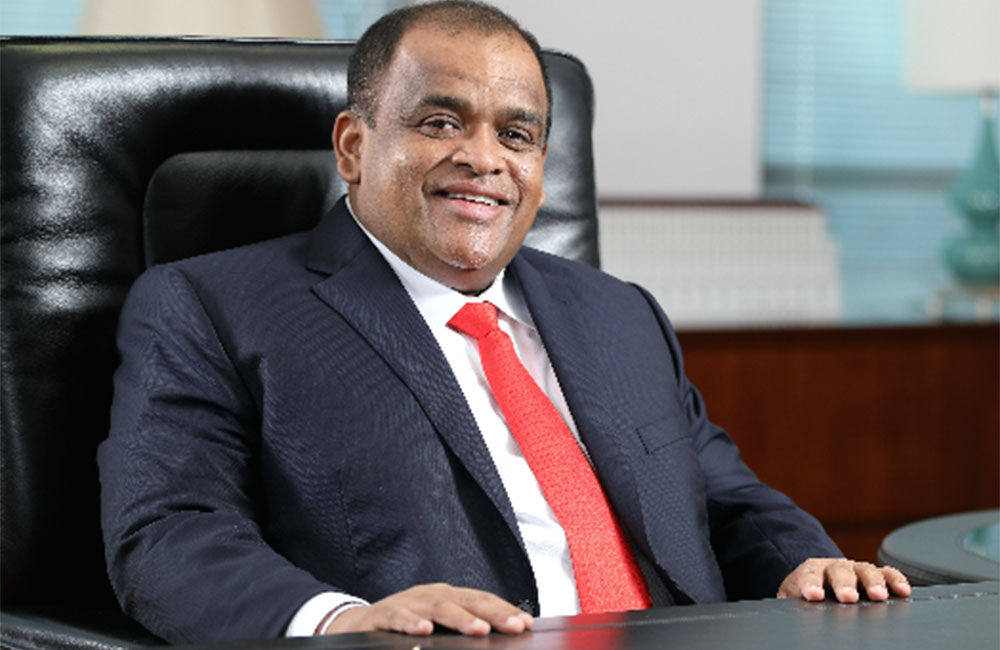
Dhammika Perera ready to contest Presidential Election if SLPP decides
Billionaire businessman and Member of Parliament Dhammika Perera says that he is ready to contest the upcoming Presidential Election if the Sri Lanka Podujana Peramuna (SLPP) takes a decision.
Perera made this remark while attending the inauguration of the SLPP’s centre for professionals, which was held this morning (05).
The event was also attended by SLPP National Organiser MP Namal Rajapaksa.
Commenting further, MP Perera said: “I am prepared to contest the Presidential Election, pending the decision of the biggest political party of Sri Lanka on their candidate. I await their decision while continuing to work towards my victory.”
“My primary focus is on developing the economy… If I am to take the stage, I have to explain how I plan to develop the economy. Therefore, I am currently formulating an economic programme. The decision rests with SLPP.”
“Many political parties have campaigned for nearly two years, yet none have presented a clear plan for economic development. With only 90 days remaining, it is imperative to outline a comprehensive economic strategy to earn the confidence of the population”, he added.
“I have personally demonstrated how the education sector can be improved, investing my own resources. My ‘DP Education’ platform stands ready to be implemented in all 10,000 schools with minimal setup required for smart classrooms.”
“Within 60 days, we can present our economic development program and persuade undecided voters to support us”, the SLPP parliamentarian further said.
(Ada Derana)
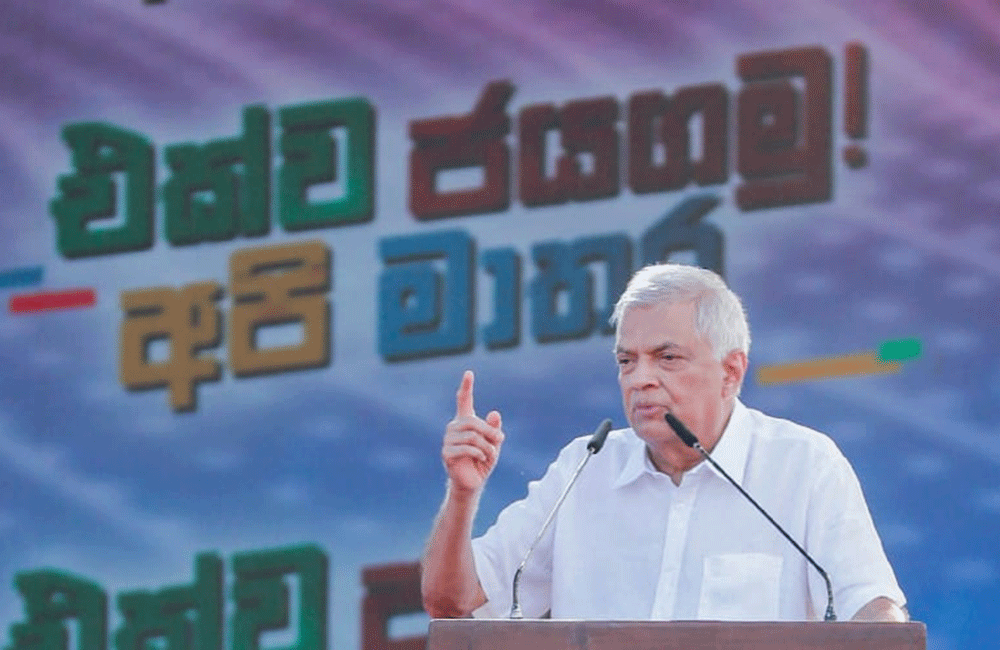
Let’s Leave Individualism and Partisanship Aside: Moving Forward Together for the Country
President Ranil Wickremesinghe stressed that, at present unity and prioritizing the nation, over individual interests or party affiliations are crucial for moving forward together.
Addressing the first rally in the “Victory through Unity” (Ekwa Jayagamu) series organized by Minister of Power and Energy Kanchana Wijesekara and titled “Victory through Unity – Matara District (Ekwa Jayagamu – Api Matara),” at Matara Fort Ground today (30), the President highlighted his administration’s extensive efforts over the past two years and underscored the critical need for collective commitment to protect and propel the nation’s political journey for the benefit of all.
The event saw a significant turnout from the Matara district, uniting people across party lines in support of national progress.
Addressing the gathering, President Ranil Wickremesinghe emphasized that today marks the start of a new political journey. He highlighted the unity of a coalition committed to the nation’s interests, regardless of political affiliations, stressing the importance of safeguarding and advancing this collective effort for the country’s success.
President Wickremesinghe also extended an invitation to the opposition, urging them to prioritize national interests over partisan politics.
He encouraged them to join this initiative, promising an opportunity to learn how to unite and build the country for the benefit of all.
President Ranil Wickremesinghe further elaborated,
“I have safely brought the Titanic, entrusted to me, to port. While other captains fled from the iceberg, we faced a critical decision: sink or navigate to safety. Now that we’ve reached port, the question is what to do next with this ship. We must decide whether to refurbish it for the next 50-100 years or hand it over in its current state to a fleeing captain.
When I arrived here today, memories of the hardships faced by the Matara people flooded back. I vividly recall spending the Sinhala New Year 2022 in Kamburupitiya, where a filling station near my hotel was constantly crowded with long queues of vehicles. Witnessing the people’s suffering and frustration, I resolved that such scenes must not recur in our country. Prior discussions with the International Monetary Fund (IMF) and exchanges with the World Bank underscored the urgency. Despite multiple notifications to former President Gotabaya Rajapaksa, ultimately, I had to assume leadership of the country.
I took charge of the country in an unprecedented manner in world history. When everyone else fled, I stepped up to lead. Constitutionally, when the President resigns and the ruling party fails to act, it falls upon the opposition to step in. Yet, everyone evaded responsibility. Our economic and political systems were shattered.
Assuming the presidency, many doubted our ability to succeed. However, I maintained strong faith in the people of our country and myself. With aid from countries like India and Bangladesh, and by encouraging farmers to ensure a successful 2022-2023 Yala season, we achieved a bountiful harvest. This enabled our nation to celebrate the Sinhala New Year, Vesak Festival, and Poson Festival with great splendour. Additionally, the people of the south played a crucial role in boosting tourism and attracting visitors to our country, thereby securing vital foreign exchange. With the united support of these efforts, we propelled our country forward.
We have partnered with the International Monetary Fund to stabilize the country’s economy, which means we cannot resort to printing money or taking loans from banks. This compelled us to explore new avenues for generating income, albeit making the tough decision to increase taxes. Today, as a result, our economy has stabilized, and we aim to relieve the common people from this tax burden in the future.
In 2023, we launched the ‘Aswesuma’ program that significantly benefited the people, providing triple benefits compared to previous efforts like ‘Samurdhi.’ The number of beneficiaries increased from 1.6 million to 2.4 million. During the economic crisis, we achieved what was previously thought impossible. During the Sinhala New Year, each low-income family received 10 kilograms of rice monthly for two months, and government employees saw a Rs. 10,000 salary increase.
Moreover, the ‘Urumaya’ program was initiated to grant freehold land deeds to all occupants of government lands. In the upcoming week, a program will begin to grant ownership of apartments in Colombo to low-income residents.
We undertook these efforts quietly but with significant benefits for the people. Moving forward, we have successfully steered clear of bankruptcy and continue to manage our debt responsibly. Through negotiations, we have secured concessions where our total debt, currently at 108% of GDP, will be restructured. Countries that provided loans have agreed to extend our repayment deadline until 2042 and have reduced the amounts due.
In addition to official loans, we have also borrowed from private individuals through bonds. Following the agreement, discussions with bondholders’ representatives are progressing well. Initially estimated to take about a month, these negotiations are proceeding smoothly, and we anticipate completing them successfully by next week. We plan to present both agreements to Parliament for approval.
I have informed the Chairman of the State Finance Committee Harsha De Silva about our intention to present all three agreements to Parliament for discussion. While I can’t detail all aspects here, I plan to provide a thorough explanation. I have informed him that following discussions and scrutiny by the State Finance Committee, we will prepare a report for a parliamentary vote. It is crucial for all parties in Parliament to participate in this vote.
The international community awaits our decision on these agreements. If any party proposes an alternative approach, I am willing to facilitate discussions with the International Monetary Fund for them. The government is willing to make arrangements to fund necessary travel permits and accommodation for these discussions. They can proceed with their talks, and if deemed beneficial, we will bring the matter to Parliament for consideration.
We can no longer afford to revert to old politics. The choices we make today profoundly impact our future. Moving away from this path begs the question: do we have an alternative future? Can we afford to return to the days of long queues and traditional politics? We must decisively choose our course.
Looking ahead, how will we sustain future fuel payments? Will borrowing become inevitable once more? Without embracing a new program, we risk facing a more severe economic crisis within the next 15 years.
Therefore, transitioning to an export-driven economy is imperative. These decisions are made with everyone’s interests in mind. We must determine whether our youth will inherit recurring economic crises or thrive in a developed nation.
That is why I urge every political leader to unite for the country. People often ask which party this cabinet belongs to, but today we have individuals who have come together solely for the country. Many former members of the SLPP have lost their ministerial positions, and although I cannot accommodate them currently, they have set aside personal interests to unite for the nation. Representatives from various parties are present here today; this is not about one party but about everyone uniting for the country’s benefit. Thus, we embark on a new political journey with the motto: country first, party second.
Regardless of their political affiliations, everyone here is part of a team capable of working for our nation. It’s crucial to sustain this political system and protect this journey together. I extend an invitation to the opposition to join us on this new path, where they can learn alongside us how to build our country.
Today, our focus is not on individual interests or party politics; we prioritize the country’s interests as we move forward. I empathize deeply with the hardships faced by our people, and I request that everyone safeguard the strides we have made and continue advancing together.”
Minister for Urban Development and Housing Prasanna Ranatunga,
Two years ago, amid the country’s economic crisis, President Gotabaya Rajapaksa and Prime Minister Mahinda Rajapaksa resigned, and we also left the cabinet, pledging our support as Podujana Peramuna to any leader who could tackle the crisis. Many leaders avoided taking responsibility, but President Ranil Wickremesinghe accepted the challenge to rescue the nation. As the Podujana Peramuna, we offered him unconditional support.
You might wonder why someone like Prasanna Ranatunga, who previously opposed Mr. Ranil Wickremesinghe during the good governance period, is now speaking in his favour. Over the past two years, you’ve witnessed the significant role President Wickremesinghe has played in steering the country away from bankruptcy and implementing a sound economic strategy. Although economic challenges persist, a leader with experience in overcoming such obstacles is needed, and Ranil Wickremesinghe is the best candidate for that role. He hasn’t declared his candidacy for the presidential election yet, but I believe that through these rallies, the people will call for his leadership.
Governor of the Southern Province Lakshman Yapa Abeywardena,
For a government to function, it must prioritize the economy and the livelihood of its people. Without this focus, a government cannot sustain itself. Two years ago, our country faced severe shortages of oil, medicine, gas, and milk powder, with no foreign currency available to purchase them. To prevent such situations, effective economic management is essential.
Throughout the past 75 years, every government has engaged in development activities. Despite 6.9 million votes for the previous government, the economy collapsed due to poor management, leading to protests against the former president. When he stepped down, he invited others to take responsibility, but only Ranil Wickremesinghe accepted the leadership unconditionally.
We need a leader who is dedicated to both the economy and the people. Regardless of opinions, if this economic program fails, another crisis could emerge within a year. Therefore, we must unite and move forward to avoid further setbacks. Ranil Wickremesinghe is the only experienced and visionary leader suited for this task.
Minister of Foreign Affairs Ali Sabry,
For the first time, I am addressing a public meeting alongside UNP representatives. In 2019, I set aside my legal career to support Gotabaya Rajapaksa in advancing the country. However, the COVID pandemic and economic crisis led to shortages of fuel and gas. During this time, former President Gotabaya Rajapaksa asked the opposition leader to take necessary measures to manage the country.
After reviewing the Treasury records, the opposition leader and their economic experts predicted an economic collapse within six months. Despite this, Ranil Wickremesinghe stepped up to address the crisis. National security goes beyond borders; it involves building Sri Lanka’s economy to be self-reliant. President Ranil Wickremesinghe has effectively accomplished this.
For example, the Prime Minister of Bangladesh recently mentioned she never expected Sri Lanka to repay the USD 200 million loan. Today, the country has avoided bankruptcy, and even instalments on Iran’s debt are being paid. All of this is due to President Wickremesinghe’s economic vision. I firmly believe that only President Ranil Wickremesinghe can create a resilient economy.
Senior Advisor to the President on National Security and Chief of Presidential Staff Sagala Ratnayaka,
In the past, the rupee depreciated uncontrollably, leading to a higher cost of living and widespread queues for gas and oil, bringing the country to a standstill. In response, Ranil Wickremesinghe took on the challenge of moving the country forward, making difficult but necessary decisions for its future. Tax system reforms were initiated, and a program to revive the economy began with the support of the International Monetary Fund.
The current government has been working to provide required service for the people. However, the country needs consistent policies that endure beyond changes in government. Strong leadership is essential for this. Under President Ranil Wickremesinghe, efforts to stabilize the economy are underway. Supporting these initiatives should be appreciated by everyone in the country.
Minister of Tourism, Lands, Sports and Youth Affairs Harin Fernando,
When no captain stepped forward to rescue the ship of Sri Lanka during a storm, Ranil Wickremesinghe took the helm and brought it safely to port. Now it’s time to set sail again for the next five years, and you have the power to return him to the captain’s position. Your support is crucial.
If you vote with the mind-set of giving the next five years to this cause, the country can avoid future destruction. Only the people can choose the leader who can either save or harm the nation. It’s vital to make the right decisions at the right time. While other parties like Samagi Jana Balavegaya (SJB) and Jathika Jana Balavegaya (JJB) offer alternatives, there is truly no substitute for Ranil Wickremesinghe. Therefore, it’s up to you to entrust him with the country for the next five years. Let’s conclude the rally that started in Matara today with a victory.
Minister of Industries and Health Ramesh Pathirana,
You may remember when we were unable to pay our national debts and became destitute. Today, the economy has significantly improved. If Ranil Wickremesinghe had not taken over during that challenging time, the current state of the country would be unimaginable.
Fortunately, he did not shy away from the challenge, providing the right leadership. That’s why we no longer see queues across the country.
Remember those hours spent in lines for fuel, medicine, and gas. We should not forget who resolved that situation. Without President Ranil Wickremesinghe, we would not have recovered as we have today.
Minister of Labour and Foreign Employment Manusha Nanayakkara,
Ranil Wickremesinghe worked tirelessly to rescue the country from economic bankruptcy within two years, despite critics doubting it was possible. He dedicated himself unconditionally to alleviating the suffering of the people.
Back then, remittances from expatriate workers amounted to USD 220 million annually, but now they have increased to about USD 700 million per month. Inflation, which was at 73%, has been reduced to single digits. The price of a gas cylinder has decreased from Rs.4500.00 to Rs.2982.00, and a kilo of dhal from Rs.660.00 to Rs.360.00.
This reflects the government’s achievements over the last two years. People no longer die in queues. Though the country was once bankrupt, it has now been saved. Additionally, President Wickremesinghe has provided relief to those in need and secured land rights for the people, greatly improving their well-being.
People once rallied to support Mahinda Rajapaksa in winning the war. Similarly, Ranil Wickremesinghe will receive support to fight the economic challenges facing Sri Lanka today. Previous elections focused on saving religion or the country, but this time, it’s about saving yourself. If a wrong decision is made, no one will come to your rescue. Let’s entrust the country to Ranil Wickremesinghe, who has guided the economy in the right direction.
Minister of Power and Energy Kanchana Wijesekera,
First, we extend our gratitude to the people of Matara district for their support. Matara is known for making historic decisions.
Over the past two years, we faced many challenges. Instead of engaging in politics, we joined forces with President Ranil Wickremesinghe to move the country forward. Despite scepticism, he accepted the challenge and advanced the nation within two years.
In the upcoming elections, we need leaders who can strengthen our future, not just deliver speeches. Without our support, the country’s situation could have been different. Looking ahead, we will continue to implement programs that provide relief to the people. Consider whether to continue on this path or risk losing these benefits in the next election.
This country requires leaders who unite rather than divide, who prioritize making sound decisions for the people. Today, we have such leadership. Therefore, following the announcement of the presidential election, a significant group of Podu Jana Peramuna stands prepared to support President Ranil Wickramasinghe.
The event was attended by Maha Sangha, other religious leaders, Deputy Speaker Ajith Rajapakse, Minister Douglas Devananda, State Ministers Rohana Dissanayake, Kanaka Herath, Wijitha Berugoda, Members of Parliament Mahindananda Aluthgamage, Vajira Abeywardena, Premanath C. Dolawatte, Director General of Trade Unions to the President Saman Ratnapriya, President’s Counsel Jayantha Weerasinghe along with number of representatives from local government bodies and members of the public.
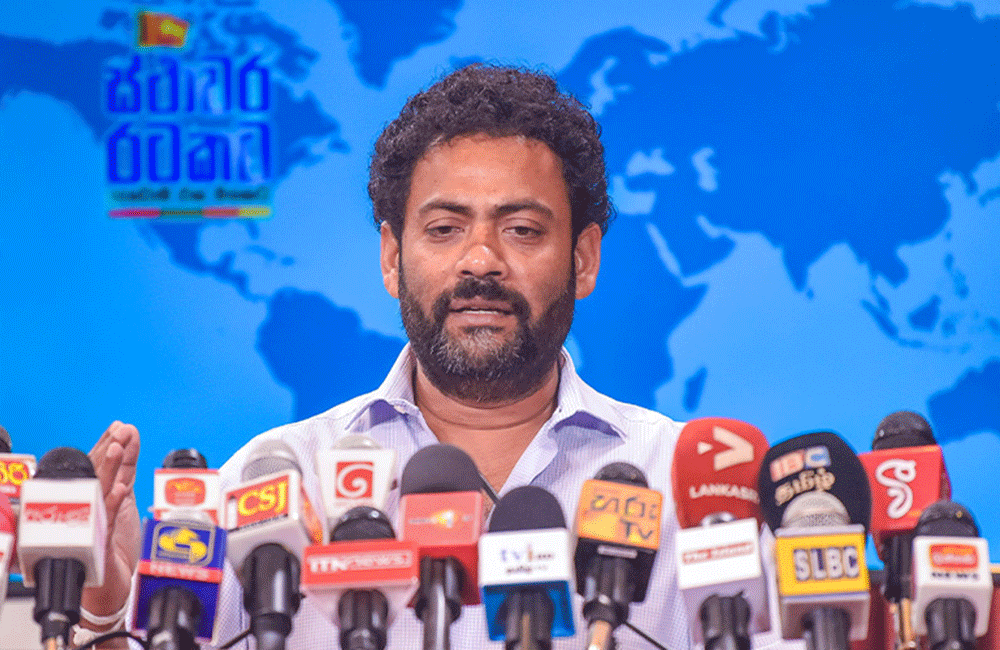
Debt Restructuring Success Revitalizes Energy Sector – State Minister for Power and Energy Indika Anuruddha
State Minister for Power and Energy Indika Anuruddha, stated that due to the success of the debt restructuring activities, the projects related to the energy sector, which were stalled during the last crisis, will be re-implemented and it will be of great help in solving the power crisis.
The Minister of State also pointed out that some parties in the opposition are engaged in sabotage to weaken the program launched by the government to develop the country.
State Minister Indika Anuruddha conveyed these updates during a media briefing at the Presidential Media Centre (PMC) held today (04) under the theme “Collective Path to a Stable Country”.
The state minister further elaborated;
“Many energy sector projects were stalled during the recent crisis. However, agreements for debt restructuring have been signed with bilateral creditor countries. This has resolved the legal issues necessary to restart these foreign-funded projects. As a result, the successful debt restructuring will significantly help address the country’s energy crisis.
Additionally, the Ceylon Electricity Board (CEB), the Public Utilities Commission of Sri Lanka (PUCSL), and the Ministry of Power and Energy have calculated the costs of producing electricity using rooftop solar panels. Consequently, prices have been reduced, and a related cabinet paper was presented last week. This has enabled us to apply for electricity purchase agreements at a lower price, allowing the CEB to achieve a loss-free situation.
Furthermore, feasibility studies and environmental reports for the Adani project are still in progress. Once these are completed, it will be discussed whether the project can proceed under the current pricing conditions.
It has been observed that some opposition parties are engaging in sabotage activities to undermine the government’s development program. They have also issued false statements regarding the construction of power plants such as Uma Oya and Sampur.
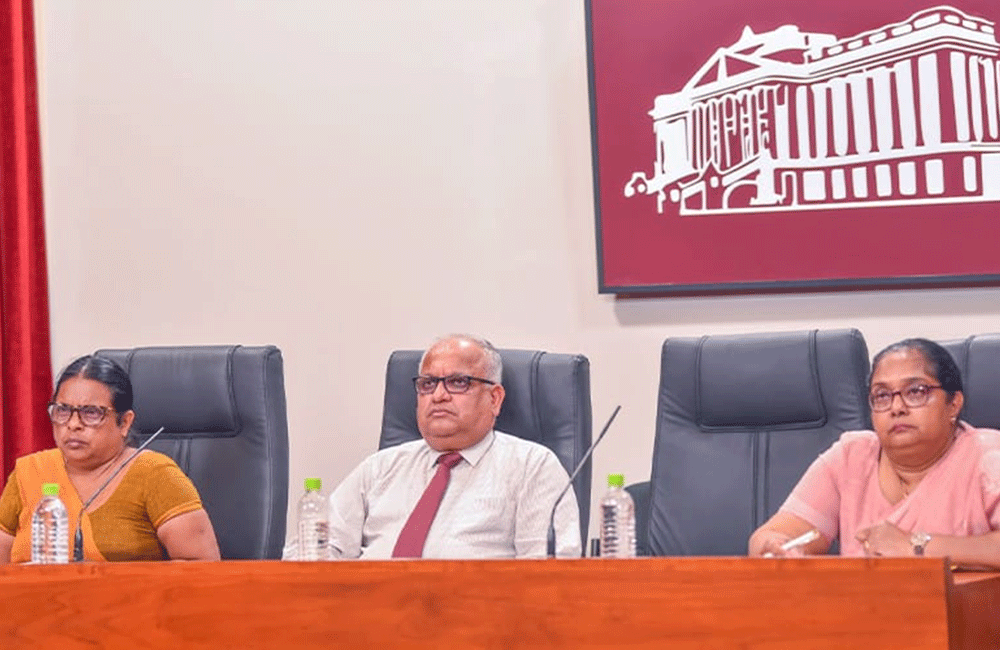
Doubling Rice Yield Achievable within Next Six harvest Seasons
Secretary to the Ministry of Agriculture and Plantation, Janaka Dharmakeerthi, announced that necessary measures are in place to achieve President Ranil Wickremesinghe’s goal of doubling the rice harvest within the next six harvest seasons. He highlighted the introduction of a technical package aimed at this objective and emphasized that the Ministry of Agriculture is effectively handling the increasing demand for food, surpassing traditional agricultural practices.
The Agriculture and Plantation Ministry Secretary shared these updates during a press briefing titled “Two Years of Progress and Advancement” held at the Presidential Media Center (PMC) today (01). He also noted that the agriculture industry is already reaping the benefits of new technology implementations.
He further elaborated:
The Ministry of Agriculture is responsible for going beyond traditional farming methods to meet the increasing demand for food, a task that is currently being managed successfully. We have implemented the necessary measures to meet President Ranil Wickremesinghe’s goal of doubling the rice harvest within the next six growing seasons. To achieve this, we have introduced a technical package as part of the agricultural modernization program. Additionally, we have arranged for the utilization of all paddy fields, including fallow fields, for rice cultivation, while using the remaining cultivated land for other crops.
It is worth noting that we have already achieved successful results in paddy cultivation, with an anticipated harvest of 800,000 metric tons of rice needed for the country.
The Ministry of Agriculture cannot directly intervene in paddy prices. However, the government aims for fair price maintenance within an open economy. While occasional price hikes may occur without government intervention, persistent increases may prompt action. Currently, only two types of rice are kept in stock, but future plans include maintaining safe stocks of all rice types for market release. In the dry zone, fallow fields are being allocated to other crops based on recommendations from the Department of Agriculture, which is a positive step for food production.
To support agricultural modernization and address food needs beyond traditional cultivation, Rs.2500 million has been allocated in the budget. Interest-free loans are being provided for various agricultural activities in 26 Divisional Secretariat Divisions, and the Youth Agricultural Entrepreneurship Project is being implemented. This initiative has increased youth entrepreneurship opportunities in agriculture, plantation industries, and animal and fishery industries. The introduction of new technology has successfully attracted young people to these sectors.
Currently, special programs are being implemented to target international markets in the agricultural industry, extending beyond local boundaries. There is a growing trend in exporting fruit crops such as strawberries, mangoes, and pineapples. Additionally, a cold storage facility is being established in Dambulla to address yield fluctuations and crop losses. Although farmers are informed about suitable crops, they often produce according to the domestic needs of the country. The management of economic centers under our ministry has successfully reduced crop damage by about 50%. With the support of farmers, we are working on a systematic method to release crops to the market. We are also in discussions with the Ministry of Transport to use the railway service to reduce post-harvest damage, particularly during transportation. Efforts are being made to deploy trains from Beliatta to other provinces to facilitate this process.
Dr. Kamani Ranatunga, Director General of the Department of Agriculture:
A technology package has been introduced to farmers under the Agriculture Modernization Program to boost the production of fruits and vegetables needed for consumption in Sri Lanka. Pilot projects are being launched on 60,000 hectares of selected land to increase paddy yield in the upcoming Maha season. The parachute method will also be introduced for paddy cultivation, aiming to achieve a yield of 7 metric tons per hectare. Efforts are underway to introduce proper fertilizers and agrochemical practices to increase the production of maize, which has been declining. In vegetable cultivation, plans are being made
to create storage facilities to manage excess production and prevent seasonal shortages. This includes providing cold storage facilities. The government’s goal is to transform farmers into entrepreneurs through these agricultural programs.
Dr. Hemali Kothalawala, Director General of the Department of Animal Production and Health:
Through 337 veterinary offices and 16 veterinary research institutes, significant strides have been made in advancing the livestock sector in this country. Under the Agricultural Modernization Program, the development of chicken and dairy farms has been a primary focus. A livestock pilot project is currently being conducted on 150 farms across six selected provinces to achieve self-sufficiency in milk production. Additionally, we have taken steps to develop grasslands and train workers. Trained workers have received NVQ 3-4 vocational training to enhance production efficiency, enabling them to pursue job opportunities abroad if needed. Our goal is to increase the current milk production, which covers 40% of Sri Lanka’s consumption, to 60% by 2028. By turning animal farm owners into entrepreneurs, we aim to make a direct contribution to the country’s economy.
Sumith Chandana, Commissioner (Services) of the Department of Agrarian Development:
After resolving the fertilizer crisis two years ago, the Department of Agrarian Development has ensured the availability of necessary fertilizers to meet the country’s needs. Arrangements have been made to supply farmers with sufficient chemical fertilizers, including urea, and fertilizers are available in the market for purchase from private dealers if needed. Over the past two years, the provision of financial subsidies and free fertilizers has led to significant crop growth. Farmers received Rs.11 billion in subsidies for the last season and Rs.5.6 billion for the current season. Modern technology has been leveraged to support farmers, with the “GeoGoviya” application collecting comprehensive data on farmers to address their needs and provide prompt services. So far, the Department of Agrarian Development has constructed 19 greenhouses. The government has allocated Rs.1499 million for 1120 projects, including tank renovations and storage facilities, to enhance agricultural infrastructure over the past year. Additionally, the “Sustainable Garden” program aims to create 1 million gardens, with land already identified for this initiative. Each garden will focus on growing a single crop, providing opportunities for commercial income.
Shiromani Edirimanne, Additional Secretary (Agri Technology) to the Ministry of Agriculture:
We have submitted our drafted agriculture policy for approval to the Ministry of Finance. This policy aims to align agricultural production programs over the next decade under 10 key elements. Additionally, efforts are underway to merge data systems of various line agencies
into a unified system, slated for completion by the end of this year. This integration is expected to enhance efficiency and facilitate better decision-making processes. Furthermore, updates are in progress for several laws, including the Seed Act, Animal Act, and Plant Protection Act. A group of officials from the Ministry of Agriculture participated in the event.
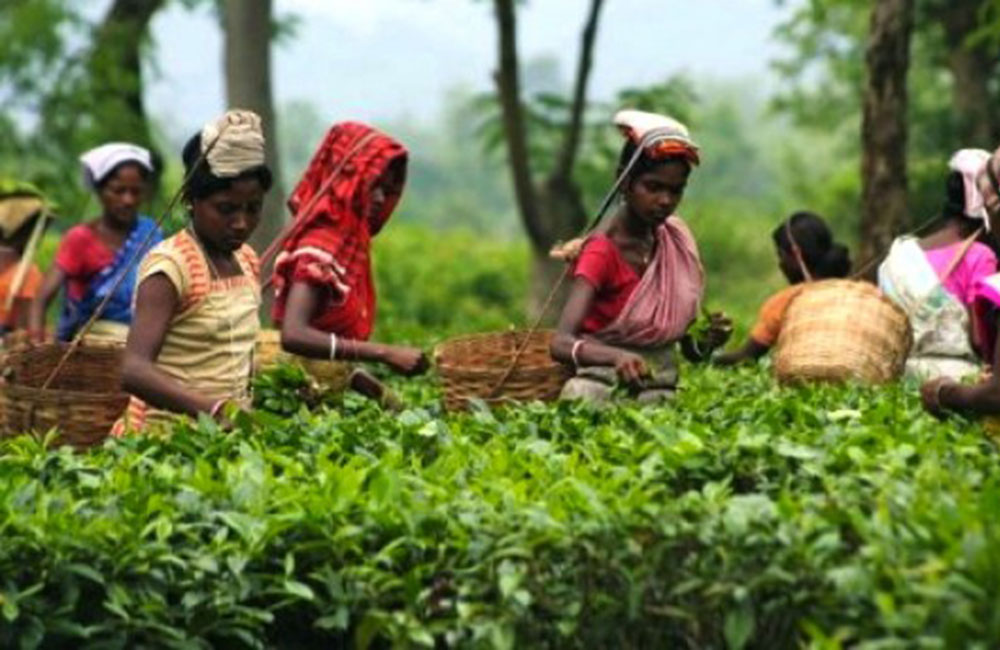
SC suspends Gazette increasing daily minimum wage of estate workers
The Supreme Court of Sri Lanka today issued an interim injunction preventing the implementation of the Gazette on increasing the daily minimum wage of Estate Sector workers.
The Supreme Court today issued the interim injunction after granting leave to proceed with a petition that had been filed challenging the minimum wage hike.
The petition had been filed by several plantation companies against the wage hike for estate sector workers.
In May this year, a Gazette notification was issued stipulating the daily minimum wage for estate sector workers to be Rs. 1,700.
The Extraordinary Gazette No. 2381/35 of April 25, 2024, was approved by the Minister of Labour and Foreign Employment Manusha Nanayakkara, with the new regulation coming into effect from May 21, 2024.
At the time, Minister Nanayakkara also warned that plantations that do not pay their workers the newly stipulated minimum wage will be reacquired by the government.
However, the Planters’ Association of Ceylon strongly opposed the government’s wage hike of Rs. 1700 for plantation sector workers, stating it objects to the Government’s arbitrary, reckless, unilateral decision to drastically hike minimum wages for tea and rubber sector workers by an unprecedented 70%.
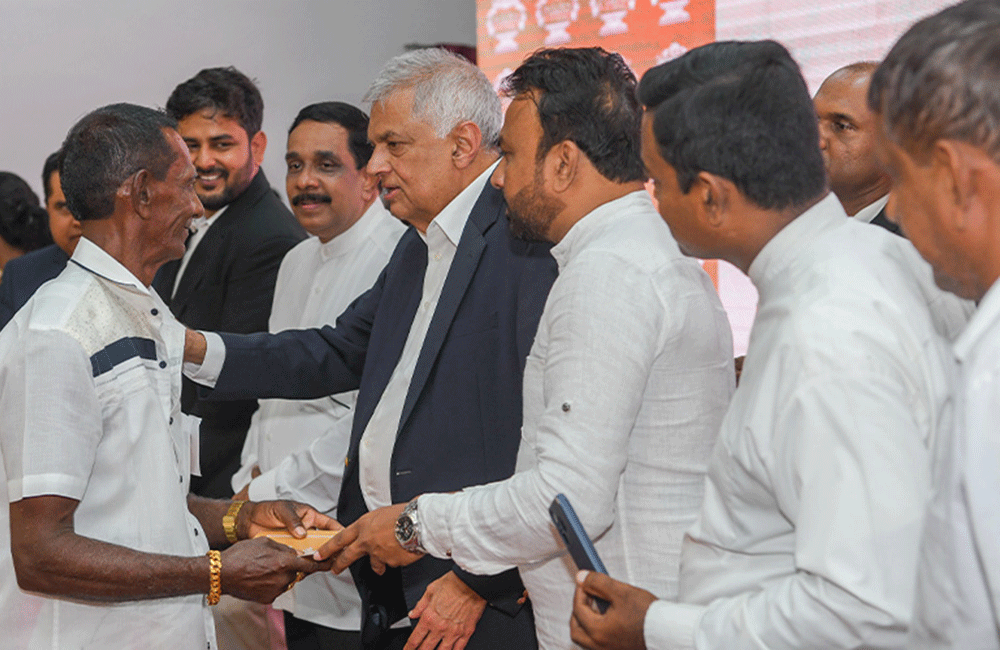
Over 41, 000 Land Deeds Granted to Monaragala District Residents through Urumaya Program
President Ranil Wickremesinghe declared a Rs.25 million allocation for the restoration of tanks in the Divisional Secretariat Division, which issues the highest number of deeds under the “Urumaya” freehold land deeds program. He highlighted that these efforts are geared towards supporting farmers and advancing the country’s development.
The President made these remarks while addressing the symbolic ceremony for the distribution of freehold land deeds to the beneficiaries in 11 divisional secretariat divisions of Monaragala district under the “Urumaya” national program, which provides 02 million freehold land deeds. The ceremony took place at the Mahinda Rajapaksa Conference Hall in Wellawaya today, where approximately 600 out of 41,960 beneficiaries received their deeds.
Continuing, the President noted that Wellassa, once a supplier of rice to the Kingdom of Kandy, was devastated after the 1818 battle. He highlighted that despite various governments’ efforts to develop the area, land rights remained elusive for its people.
President Ranil Wickremesinghe also outlined plans for the extensive agricultural development of Udawalawa, Monaragala, Ampara, and the Mahaweli C Zone in the dry zone.
During his visit to grant land deeds in Monaragala district, the President interacted with the residents, engaging them in friendly conversations while gathering information from them.
The President further elaborated;
“According to the speakers preceding me, the Wellassa area supplied the rice required by the Kingdom of Kandy. However, after the 1818 battle, Wellassa was completely devastated, causing its inhabitants to relocate to other areas. Subsequently, the Monaragala district was established in 1960. When I first visited this area after the 1977 elections, it was severely underdeveloped.
Since 1977, various governments have initiated development projects in the Monaragala district. People from surrounding provinces settled here, new houses were constructed, and the area gradually urbanized. Through the hard work of its people, Monaragala evolved into an agricultural hub. This area stands as a testament to the efforts of your ancestors, yet the residents lacked proper land rights. The contributions of Monaragala farmers to the country were historically overlooked. To express gratitude, we have now ensured that these farmers receive free land rights. We are delighted to make this contribution.
To foster the development of the Monaragala district, we advocated for the provision of free land rights, despite opposition and legal challenges. Today, we have successfully granted these rights to the people.
However, securing land rights alone is insufficient. It is crucial for everyone to participate in the government’s agricultural modernization program. By rapidly advancing agriculture in these areas, we aim to transition towards an export-oriented economy. Essential infrastructure, including ports and airports, is already in place in these areas.
Our vision is to transform Udawalawa, Monaragala, Ampara, and the Mahaweli C Zone into a major agricultural hub within the dry zone. Through the “Urumaya” program, we not only provide land rights to farmers but also equip them with tools to increase their incomes. Looking ahead, the global demand for food is expected to grow significantly in the next 30 to 40 years. It is imperative that we prepare to meet this challenge by establishing a comprehensive agricultural framework in these provinces.
Additionally, we have strategized to establish large investment zones in Hambantota and Monaragala districts. Efforts are also underway to enhance the tourism and fishing industries, spanning from Galle to Ampara. These initiatives are slated for implementation over the next 20-30 years, ensuring a legacy for future generations. The development program has significantly boosted Wellawaya, serving as a pivotal access point to the upcountry. This progress extends through Passara via Ella and Bibila.
To streamline the issuance of “Urumaya” freehold land deeds, measures have been taken to recruit necessary personnel. However, it is imperative to accelerate this program. The list of eligible recipients is available at each Divisional Secretariat Division. I urge all Divisional Secretariats to promptly summon beneficiaries to address any issues and expedite the distribution of these deeds.
The Chairman of the Regional Development Committee is encouraged to collaborate with the Divisional Secretary in overseeing these tasks, ensuring their completion by the end of this month. I am actively pursuing funding of Rs.25 million for the restoration of tanks within the divisional secretariat that issues the highest number of freehold land deeds. It is crucial to note that the recipients of these land deeds will benefit significantly from both of these programs. We invite everyone to embark on a new journey with these land rights, fostering a fresh start in life.
Minister of Ports, Shipping and Aviation Nimal Siripala de Silva;
Janatha Vimukthi Peramuna MPs have made various complaints regarding the Uma Oya project. However, our government has prioritized providing water to farmers in Uva Wellassa.
It is worth noting that we are privileged to contribute to strengthening Mr. Ranil Wickremesinghe’s programs. He is a visionary leader who has made tough decisions for the benefit of the country and its people. His innovative initiatives have been instrumental in this regard. After a lapse of four years, decentralized funds are now operational, catalyzing village development. It is important to highlight that his visionary and innovative leadership will bolster the economy.
State Minister of Foreign Employment Promotion Jagath Pushpakumara;
As political representatives, we have distributed land deeds on numerous occasions. However, the significance of this particular deed lies in its nature as a freehold land deed. The absence of such rights has subjected people to various hardships in the past.
Today’s issuance of these deeds represents a legacy handed down to your children. It was under the President’s directive that we extended free land deeds to a large number of individuals.
During those challenging times, we faced shortages of gas and fuel, and agricultural operations stalled due to a lack of fertilizer. Despite the crisis, there were no contenders stepping forward to take charge of the country’s future. We hold the President in high regard for assuming this responsibility for the country’s future.
State Minister of Irrigation Shasheendra Rajapaksa;
Today marks a profoundly significant day for you. By toiling with the fertile soil and nurturing every inch, you contribute greatly to the bountiful harvest of our country. Your dedication is honoured, especially for sustaining those who depend on rice for all their meals.
It’s noteworthy that the highest number of beneficiaries under the President’s initiative to provide 02 million “Urumaya” freehold land deeds is in the Monaragala district. Today, you have secured the rights that your ancestors awaited for generations.
This district plays a pivotal role, with 60% of its produce distributed to other districts—a substantial contribution. Despite plans to establish an economic hub to support this productivity, the endeavour has yet to materialize. As we look forward, we anticipate your leadership and urge the allocation of necessary resources in the upcoming budget to fulfil this vision.
State Minister Vijitha Berugoda, Member of Parliament Gayashan Navananda, and Co-Chairman of the Monaragala District Coordinating Committee Kumarasiri Ratnayake also addressed the gathering.
Maha Sanghaa of the province, Uva Provincial Governor A.J.M. Muzammil, Wellawaya United National Party Organizer Chaminda Sarath, along with other political representatives from the province, Monaragala District Secretary Pasan Rathnayake, Senior Additional Secretary to the President Chandra Herath, and various government officials were also in attendance at this event.
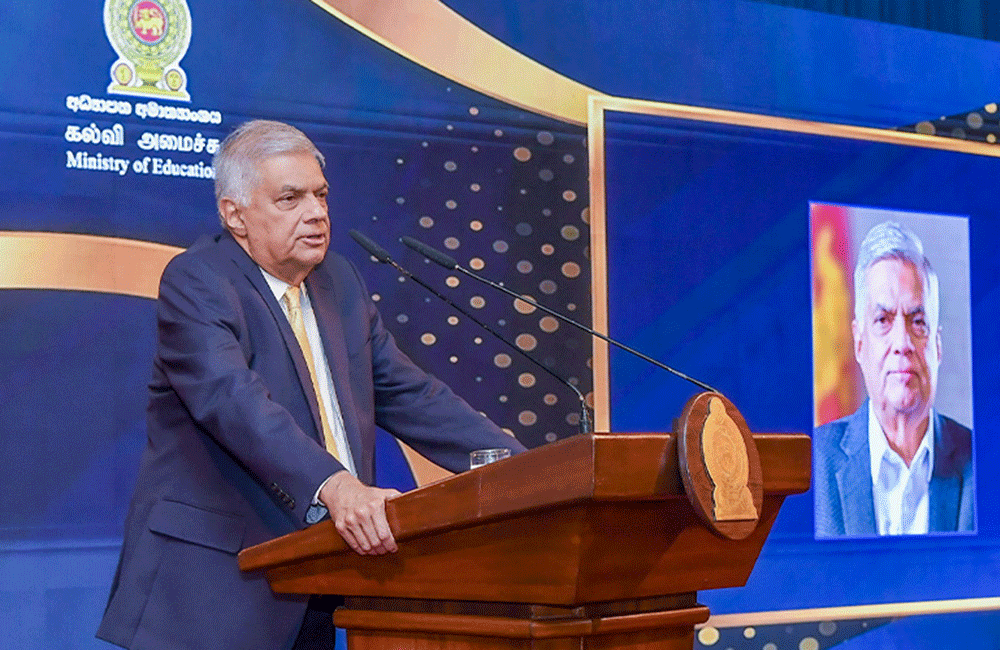
Teaching Profession Calls for Dedication to Future Generations
President Ranil Wickremesinghe stressed the importance of those entering the teaching profession dedicating themselves to the future generation, noting that education in a country cannot thrive without discipline.
He declared that no one would be permitted to disrupt school education between 7:30 am and 1:30 pm and he has directed the Attorney General to consider further measures to ensure this.
The President made these remarks while attending a ceremony at Temple Trees today (03), where appointments were awarded to officers of the Education Administrative Service, as well as teaching appointments to graduates and diploma holders.
The president, who requested that everyone prioritize children’s education, also asked the opposition not to support acts of sabotage.
Furthermore, the President mentioned that he has discussed with the Minister of Education the future process of teacher transfers and promotions through an online system, emphasizing that no one will face injustice in these matters.
Appointments were granted to 60 individuals approved by the Education Service Committee of the Public Service Commission, and teaching positions were awarded to 1,706 graduates and 453 English diploma holders.
President Ranil Wickremesinghe symbolically presented several appointments to them.
The president further elaborated,
Congratulations to all of you entering the administrative and teaching services. Today, you are assuming a very important responsibility.
Even when the country faced bankruptcy in the past two years, and as we took steps to recover, funding for education was increased.
Teachers were recruited not only for existing vacancies but also for future needs. It must be said that even in difficult times, these steps were taken with a focus on the country’s future.
Our future is our children. That is why the government is committed to equipping the next generation with new knowledge and modern technology in a changing world. This is a responsibility we all share.
Therefore, everyone entering this honourable profession should dedicate their service to the future generation and must be disciplined.
Education in a country cannot be maintained without discipline. You may have 40-50 students in your classroom, but there is a difference between a teacher and a military officer. Military officers train adults, whereas you will be guiding a group of individuals under 18 years of age who need proper training and attention. If we do not protect the country’s education system and allow it to be disrupted, we will lose our future generation.
To build the country’s economy, we must move forward rapidly. In the next 20-25 years, we should aim to raise our Gross Domestic Product (GDP) from USD 85 billion to at least USD 350 billion for our future generations.
It is, therefore, the responsibility of all of us to focus on and prioritize the children’s future. The teaching profession is distinct from other services; it carries a unique dignity that must be upheld.
Today’s schools must uphold discipline. Strikes in schools are detrimental and unjustified. In 2022, under President Gotabaya Rajapaksa’s administration, the only salary increase was for teachers. This year, we provided a stipend of Rs. 10,000 for all government employees. Given the country’s economic situation, further increases were not feasible. Some trade unions have requested a revision and additional salary increases, which is surprising considering teachers have already received two salary increments.
Recently, teachers went on strike, abandoning classrooms to protest at the Colombo Fort railway station. University students and others joined, demonstrating and attempting to reach the Presidential Secretariat, even amidst tear gas. While protests are not new, such actions do not befit the honourable teaching profession.
In the past, teachers on strike would still teach without signing attendance books, or they might wear a black armband while continuing their duties, as seen in some countries. However, the most recent strike was entirely different.
This situation did not occur in Tamil and Muslim schools, where educational activities for children continued. Similarly, international schools and private schools maintained their educational activities effectively.
However, Sinhala-medium schools had to face disruptions. Children from rural areas attend these schools. I question whether this is also a responsibility of the teaching profession. Teachers of Tamil and Muslim schools recognized the importance of education. When Sinhala-medium schools in places like Nuwara Eliya were disrupted, education continued in Tamil-medium schools. Such disparities should not exist in our country.
In certain schools, teachers faced threats preventing them from attending. People fault the government for its lack of action and accuse the opposition of backing such incidents. This situation is troubling.
No one, whether directly or indirectly, should disrupt school education from 7:30 am to 1:30 pm. I have requested the Attorney General to propose measures regarding this issue. It is imperative that the education of children is not hindered by school closures or strikes. Our actions must be taken with future generations in mind.
Yesterday, I discussed with the minister the possibility of implementing a computerized teacher transfer system. Fairness must prevail in promotions and in the treatment of teachers. Moving forward, we will take stronger measures on this front, even if it may provoke dissent. This is the reality we must confront to secure a better future for our children.
Therefore, I urge everyone to prioritize the future of our children. I particularly appeal to the opposition not to endorse actions that sabotage education. We must heed the voices of the people and parents in our decisions. Once again, I extend my best wishes to all entering the teaching profession today.”
Minister of Education, Susil Premajayantha,
“Granting these teacher appointments is not an easy task. We undertook the task amid an economic crisis, striving to fulfil nearly 2000 appointments for national schools today. The economic strategy led by President Ranil Wickremesinghe aimed to alleviate the country’s financial challenges and establish stability has shown promising results.
During a period of economic turmoil, as the Minister of Finance, President Ranil Wickremesinghe appointed you while allocating funds. I urge you not to jeopardize the future of our children by accepting these appointments and participating in trade union actions. Your educational journey as a graduate was made possible by the dedication of teachers. It is crucial to ensure our children receive education and pursue careers, lest their future be obscured.
In the past, teachers took trade union action against a bill proposed by Minister of Education Mr. Iriyagolle, teaching children without signing the book. I believe their actions serve as a commendable example.
President Ranil Wickremesinghe, during his tenure as Minister of Education, established the National Institute of Education and significantly strengthened the educational infrastructure. He also introduced the University Grants Commission Act, and under the current president’s leadership, science faculties have been established, producing approximately 5000 teachers annually. Having someone with such a distinguished record in the sector of education as the current president is a great asset to the education sector.
In the upcoming education reforms, efforts are underway to ensure that university graduates have ample job opportunities without the need for undue influence. These reforms aim to produce graduates well-suited for the job market. Proper management of human resources through education can significantly bolster a country’s economic strength.Governor of the Western Province Marshal of the Air Force Roshan Gunathilake, State Ministers Vijitha Berugoda and Aravind Kumar, and Secretary to the Ministry of Education Thilaka Jayasundara were also present at the event.

Fuel prices reduced
The Ceylon Petroleum Corporation (CPC) has announced the revision of fuel prices with effect from midnight today (30).
Accordingly, the price of Petrol 92 Octane has been reduced by Rs. 11 to Rs. 344 per liter while Petrol 95 Octane has been reduced by Rs. 41 to Rs. 379 per liter.
The price of Super Diesel has also been slashed by Rs. 22 with the new price at Rs. 355 per liter.
However, the prices of Auto Diesel and Kerosene remains unchanged, the Ceypetco said.
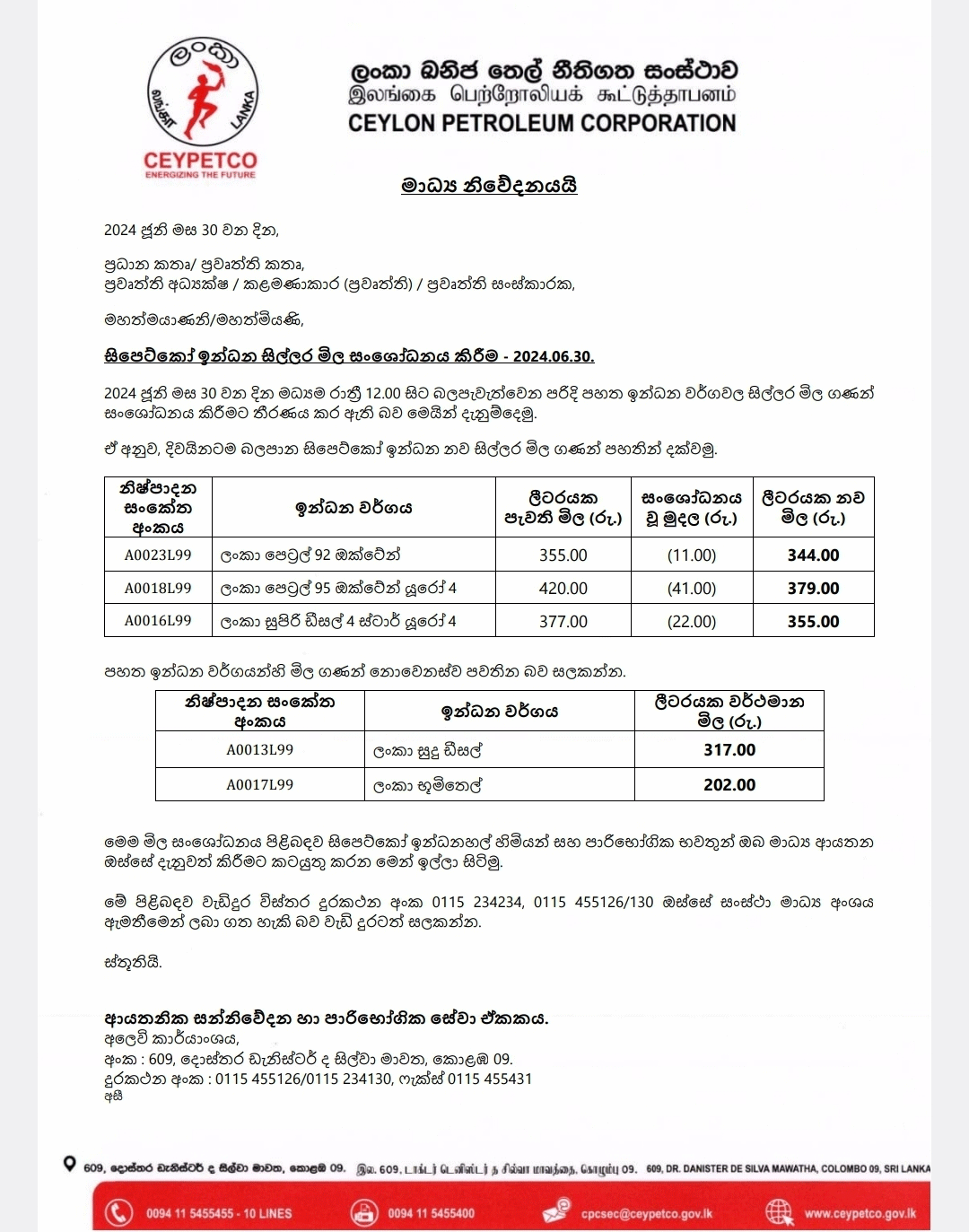
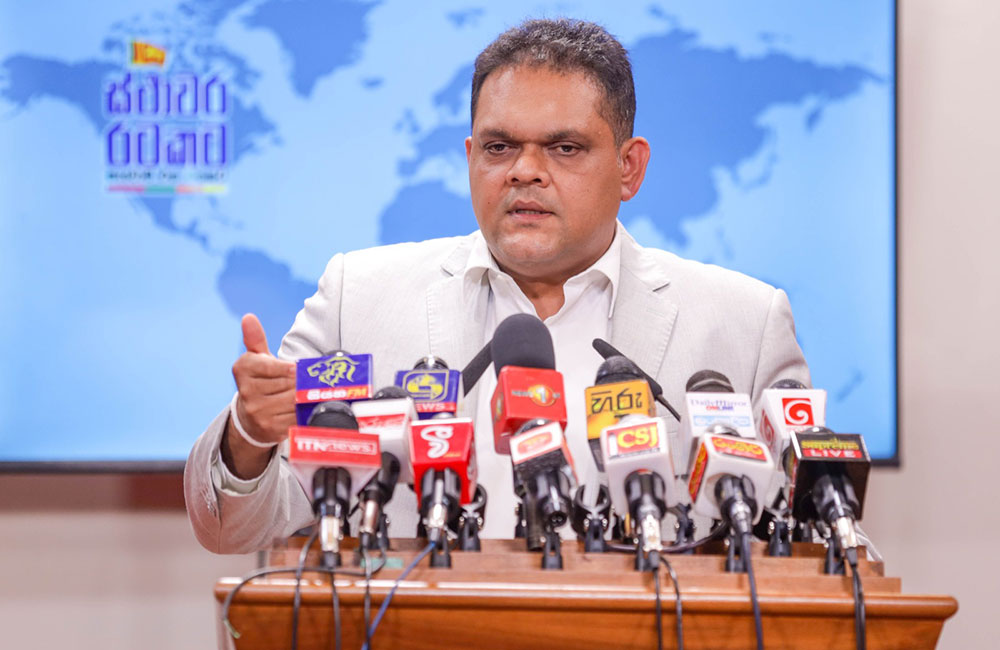
Uncertainty over Achieving Debt Sustainability Ends – State Minister for Finance Shehan Semasinghe
State Minister for Finance Shehan Semasinghe, announced that all uncertainties surrounding Sri Lanka’s debt sustainability have been resolved.
He noted that while the international community has shown optimism about Sri Lanka’s debt restructuring, some local parties remain sceptical for political reasons.
State Minister Semasinghe made these remarks during the press briefing titled “Collective Path to a Stable Country” held at the Presidential Media Centre today (02).
Addressing the Media Personnel, the state minister further elaborated;
The good news about debt restructuring, which is crucial for rebuilding the country’s economy, has been received. On June 26, agreements were reached with the Official Creditor Committee and the Paris Club countries as bilateral creditors. Additionally, an agreement was made with China Exim Bank on the same day, completing two essential aspects of debt restructuring.
The international community has expressed optimism about Sri Lanka’s debt restructuring. However, some parties refuse to view this process positively for political reasons. It is very unfortunate for the country. Initially, we believed that the criticism from some parties stemmed from a lack of understanding of our efforts.
It is now evident that those statements are made due to political hypocrisy. This was clearly demonstrated by the opposition when President Ranil Wickremesinghe addressed Parliament today. Therefore, the public should recognize the extent to which political manoeuvring is interfering with the country’s economic progress.
Comments were made about the situations in countries like Ghana, Ecuador, and Argentina. However, it’s important to understand the differences in debt restructuring between low-income and middle-income countries. Debt restructuring in Sri Lanka, a middle-income country, is more complex than in low-income countries. Despite this, Sri Lanka is ahead in the debt restructuring process compared to other middle-income countries.
Additionally, we are prepared to demonstrate three key points regarding debt restructuring. Our creditors have granted a grace period from 2024 to 2027 for debt repayment. During this period, we have the opportunity to use approximately USD 5 billion for the benefit of the country’s people.
By 2032, the public debt-to-GDP ratio should be reduced to 95%. The gross financial requirement needs to be lowered to 13% between 2027 and 2032, and foreign debt servicing should be reduced to 4.5% during the same period.
We have now agreed on a specific debt restructuring plan to achieve these three goals, eliminating all uncertainties regarding the country’s debt sustainability.
Through this economic management approach, inflation in Sri Lanka has decreased from 70% to 1.7%. Additionally, the interest rate for one-year treasury bills has reached 10% in the country’s Treasury bill auction.
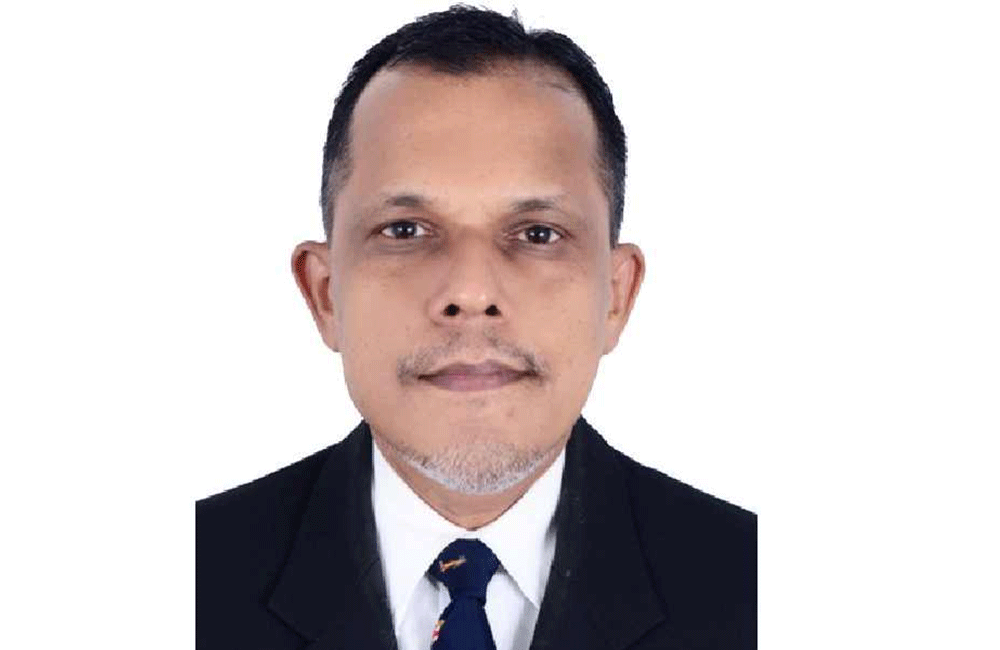
Parinda Ranasinghe (Jnr.) To Become Acting AG
Senior Additional Solicitor General Parinda Ranasinghe (Junior) said that he will be sworn in as Acting Attorney General on Monday(01).
Parinda Ranasinghe is the son of former Chief Justice Parinda Ranasinghe.
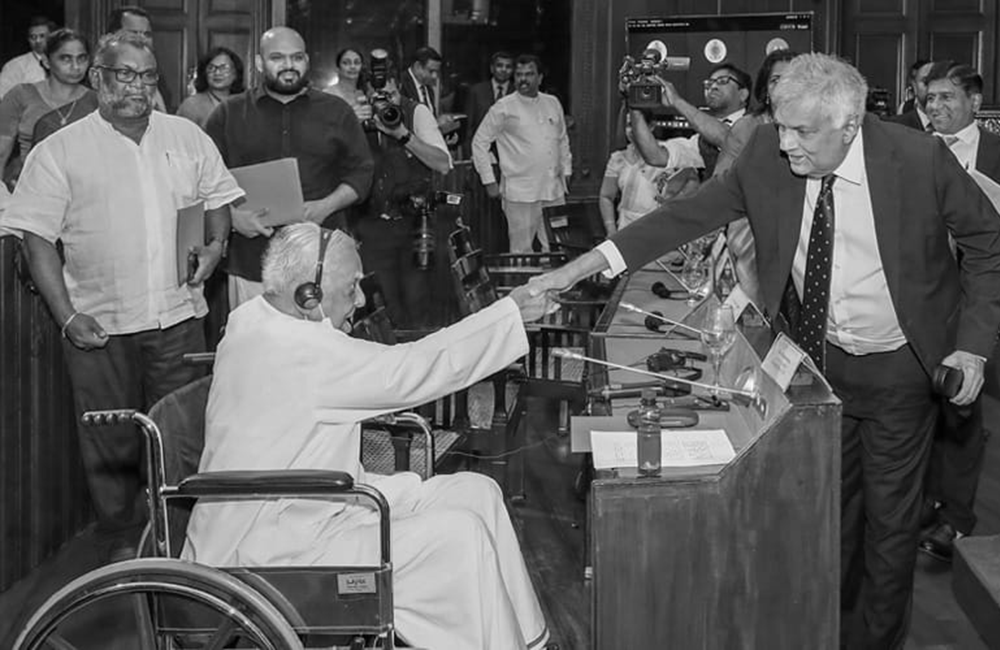
President commends Sampanthan’s Unwavering Commitment to Sri Lanka’s Territorial Integrity
President Ranil Wickremesinghe emphasized that the late leader of the Tamil National Alliance (TNA), MP R. Sampanthan, consistently advocated for Sri Lanka’s territorial integrity and held his distinct perspective on power-sharing.
President Wickremesinghe noted that as show of appreciation for Mr. Sampanthan’s significant contributions in this regard; completing the tasks he started would be the best tribute to his legacy.
The President made these remarks in his special condolence message in Parliament today (02), on Mr. Sampanthan’s passing.
President Ranil Wickremesinghe further stated;
Today, one of my colleagues who accompanied me to Parliament, MP Sampanthan, has passed away.
I had the privilege of working closely with him during challenging times, and I deeply appreciate the contributions he made. Despite representing the Tamil United Liberation Front (TULF) and the Tamil National Alliance (TNA), he consistently upheld Sri Lanka’s territorial integrity.
I recall a conversation we once had where he said to me, “Ranil, do you think I would ever advocate for dividing our country? I witnessed our independence in 1948 as a child.”
None of us witnessed that opportunity; most of us weren’t even born at the time. However, he held his own views on how power should be devolved. There is no need to dispute them, as he dedicated considerable effort to his beliefs. While there remains some unfinished business in this regard, completing those tasks would be the greatest tribute we can offer him.
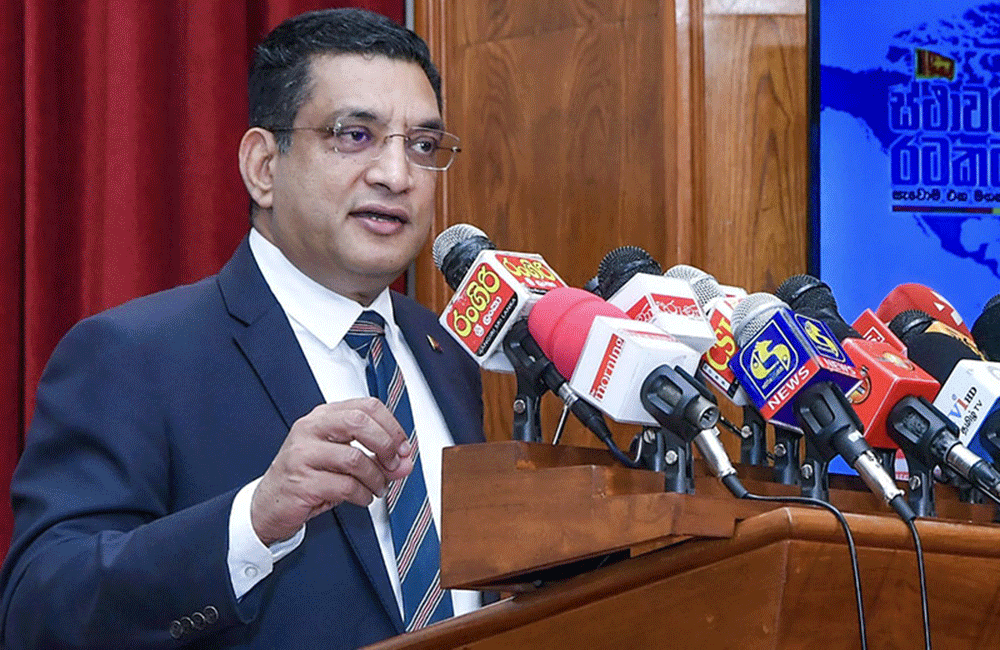
17 B USD gain from debt repayment plan, says Ali Sabry
Sri Lanka benefits from a debt repayment sustainability plan, gaining an advantage of USD 17 billion- Minister of Foreign Affairs Ali Sabry Minister of Foreign Affairs and President’s Counsel Ali Sabri, stated that the successful debt sustainability process with bilateral creditors will provide Sri Lanka with an advantage of approximately US $ 17 billion.
The minister also stated that this situation will facilitate successful negotiations regarding international sovereign debts.
He was speaking to the media yesterday (28) at the Presidential Media Centre (PMC) under the theme “Collective Path to a Stable Country.”
The Minister further commented,
“On April 12, 2022, Sri Lanka decided to temporarily suspend the payment of a portion of its foreign debt. At that time, some parties predicted that the value of the rupee would surge to 600, 700, or even 1000 against the dollar. However, we managed to control the situation.
Following an agreement with the International Monetary Fund (IMF), we were instructed to restructure the debt. Lazard was appointed as our financial advisor, and Clifford Chance as our legal advisor for this process.
Initially, we focused on restructuring domestic debt while continuing to meet our obligations to multilateral organizations.
We have now successfully completed debt restructuring with bilateral creditor countries. India, Japan, and France formed an Official Creditor Committee (OCC) for managing bilateral debt and we also held talks with China. As a result of these efforts, Sri Lanka has achieved a sustainable debt repayment situation, gaining an advantage of approximately US $ 17 billion and numerous other benefits.
Furthermore, this achievement is expected to facilitate successful negotiations with international sovereign bond holders. Discussions on this matter are currently on-going.
Additionally, it’s important to note that the comprehensive debt restructuring must adhere to a specific timeline set by the International Monetary Fund. The total debt burden should be reduced to 95% of the Gross Domestic Product (GDP), and the current interest payments on foreign loans should be limited to 4.5% of the GDP.
Page 51 of 534